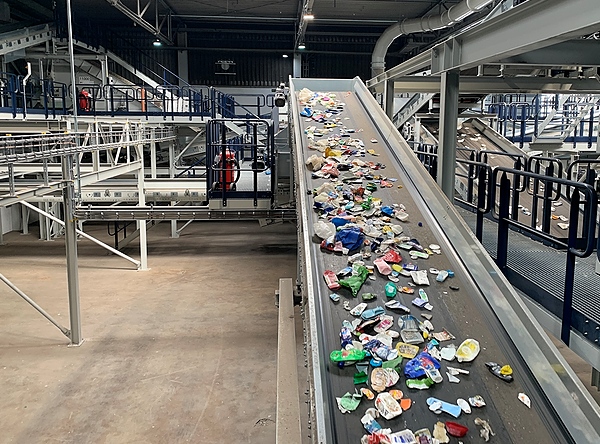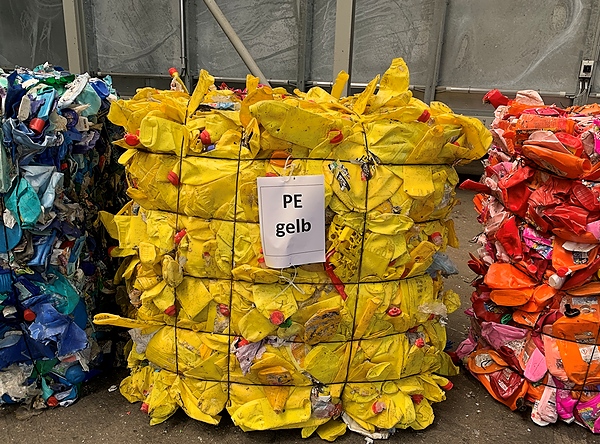REMONDIS
German waste services firm erects EUR 12 mn plastics sorting plant / Unit recognises six colours, multi-layers packs
Remondis (Lünen, Germany; www.remondis.de) said it has spent some EUR 12 mn to build a domestic plastics sorting facility in Bochum, with the plant’s official dedication occurring 13 June.
In the three-storey plant at the site of its recycling subsidiary RE Plano (Lünen; www.replano.com), packaging from regional kerbside collection systems are pre-sorted according to colour and material. They are subsequently shredded, washed, and extruded by the disposal services provider at its Lünen plant around 40 km away.
In the three-storey plant at the site of its recycling subsidiary RE Plano (Lünen; www.replano.com), packaging from regional kerbside collection systems are pre-sorted according to colour and material. They are subsequently shredded, washed, and extruded by the disposal services provider at its Lünen plant around 40 km away.
 The plant in operation (Photo: PIE) |
“We need more sorting in the material cycle than before because, on the one hand, consumers do not separate their waste correctly – with the main problem here being too much waste wrongly thrown into the yellow bin or yellow bag,” a company spokesperson told Plasteurope.com. “Secondly, the packaging industry presents us with new challenges by providing us with packaging that cannot be optimally recycled.”
The new plant is said to allow Remondis for the first time to sort six different colours and, in addition to polymer types, to distinguish between monolayer and multilayer packs. The used packs are allocated to the material flows of natural, white, green, blue, yellow, or red, while the distinction according to polymer type is made between HDPE, polyethylene, and PET.
Along conveyer belts running at 3 m/s, multi-stage photo sensors are used as well as near-infrared technology – for example, from German sensor separation technology producer Steinert (Cologne, www.steinert.de). A spokesperson said one special feature at the Bochum plant is that silicone cartridges can be recognised and ejected before causing problems in downstream processes because of product adhesion.
 The result of sorting: batches separated by colour and material (Photo: PIE) |
The capacity of the plant, which has been in operation since the end of February, is 30,000 t/y of input material stems predominantly from Germany but also from the Benelux countries and France due to their proximity. Plastics from the sorting of commercial waste can also be processed. The pre-sorted material in Bochum is subsequently washed and extruded in Lünen, whereby the washing facility there has a capacity of 24,000 t/y and the extrusion line a processing capacity of 36,000 t/y, the company said.
“Germany is a country that is poor in raw materials. For this reason, we must try to qualify the raw materials here in Germany,” said Norbert Rethmann, honorary chairman of the supervisory board of the Remondis parent company Rethmann Group.
Related: Werner & Mertz CEO criticises low recyclate content in detergent industry
With more than 40,000 employees, Remondis recently posted sales of EUR 12.6 bn. Annual investment by the family group is more than “one billion euros”, the honorary board chairman.
In addition to Lünen, Remondis operates German mechanical recycling plants in Zeitz (PET; 48,000 t/y), Hamburg (PET; 48,000 t/y ), Lüneburg (PET; 10,000 t/y), Vechta (engineering plastics; 40,000 t/y), Neuenstein (engineering plastics; 10,000 t/y), and Siegelsbach (LDPE; 15,000 t/y).
20.06.2023 Plasteurope.com [252978-0]
Published on 20.06.2023

 German version of this article...
German version of this article...